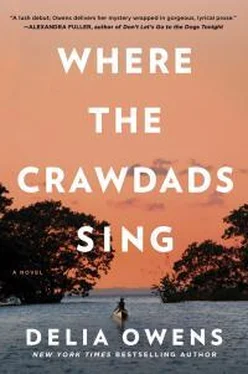Archbald Lab offered Kya a job, but she turned it down and continued writing her books. She and Tate hired the fix-it man again, and he built a lab and studio—of raw wood, hand-hewn posts, and tin roof—for her behind the shack. Tate gave her a microscope and installed worktables, shelves, and closets for her specimens. Trays of instruments and supplies. Then they refurbished the shack, adding a new bedroom and bath, a larger sitting room. She insisted on keeping the kitchen as it was and the exterior unpainted, so that the dwelling, more of a cabin now, remained weathered and real.
From a phone in Sea Oaks she called Jodie and invited him and his wife, Libby, for a visit. The four of them explored the marsh and fished some. When Jodie pulled in a large bream, Kya squealed, “Lookee there. You got one big as Alabamee!” They fried up fish and hush puppies big as “goose aigs.”
Kya never went to Barkley Cove again in her life, and for the most part, she and Tate spent their time in the marsh alone. The villagers saw her only as a distant shape gliding through fog, and over the years the mysteries of her story became legend, told over and over with buttermilk pancakes and hot pork sausages at the diner. The theories and gossip over how Chase Andrews died never stopped.
As time passed, most everyone agreed the sheriff never should’ve arrested her. After all, there was no hard evidence against her, no real proof of a crime. It had been truly cruel to treat a shy, natural creature that way. Now and then a new sheriff—Jackson was never elected again—would open the folder, make some inquiries about other suspects, but not much came of it. Over the years the case, too, eased into legend. And though Kya was never completely healed from the scorn and suspicion surrounding her, a soft contentment, a near-happiness settled into her.
• • •
KYA LAY ON THE SOFT DUFF near the lagoon one afternoon, waiting for Tate to return from a collecting trip. She breathed deep, knowing he would always come back, that for the first time in her life she would not be abandoned. She heard the deep purr of his cruiser, chugging up the channel; could feel the quiet rumble through the ground. She sat up as his boat pushed through the thickets and waved to him at the helm. He waved back but didn’t smile. She stood.
He tied to the small wharf he had built and walked up to her on the shore.
“Kya, I’m so sorry. I have bad news. Jumpin’ died last night in his sleep.”
An ache pushed against her heart. All those who left her had chosen to do so. This was different. This was not rejection; this was like the Cooper’s hawk returning to the sky. Tears rolled down her cheeks, and Tate held her.
Tate and almost everyone in town went to Jumpin’s funeral. Kya did not. But after the services, she walked to Jumpin’ and Mabel’s house, with some blackberry jam long overdue.
Kya paused at the fence. Friends and family stood in the dirt yard, swept clean as a whistle. Some talked, some laughed at old Jumpin’ stories, and some cried. As she opened the gate everyone looked at her, then stepped aside to make a path. Standing on the porch, Mabel rushed to Kya. They hugged, rocking back and forth, crying.
“Lawd, he loved ya like his own dawder,” Mabel said.
“I know,” Kya said, “and he was my pa.”
Later, Kya walked to her beach and said farewell to Jumpin’ in her own words, in her own way, alone.
And as she wandered the beach remembering Jumpin’, thoughts of her mother pushed into her mind. As though Kya were once again the little girl of six, she saw Ma walking down the sandy lane in her old gator shoes, maneuvering the deep ruts. But in this version, Ma stopped at the end of the trail and looked back, waving her hand high in farewell. She smiled at Kya, turned onto the road, and disappeared into the forest. And this time, finally, it was okay.
With no tears or censure, Kya whispered, “Good-bye, Ma.” She thought of the others briefly—Pa, her brother and sisters. But she didn’t have enough of that bygone family to bid farewell.
That regret faded too when Jodie and Libby began bringing their two children—Murph and Mindy—to visit Kya and Tate several times a year. Once again the shack swelled with family around the old cookstove, serving up Ma’s corn fritters, scrambled eggs, and sliced tomatoes. But this time there was laughter and love.
• • •
BARKLEY COVE CHANGED over the years. A man from Raleigh built a fancy marina where Jumpin’s shack had leaned for more than a hundred years. With bright blue awnings over each slip, yachts could pull in. Boaters from up and down the coastline moseyed up to Barkley Cove and paid $3.50 for an espresso.
Little sidewalk cafés with smart-colored umbrellas and art galleries with seascapes sprouted on Main. A lady from New York opened a gift shop that sold everything the villagers didn’t need but every tourist had to have. Almost every shop had a special table displaying the books by Catherine Danielle Clark ~ Local Author ~ Award-Winning Biologist . Grits were listed on the menus as polenta in mushroom sauce and cost $6.00. And one day, some women from Ohio walked into the Dog-Gone Beer Hall, never imagining they were the first females to pass through the door, and ordered spicy shrimp in paper boats, and beer, now on draft. Adults of either sex or any color can walk through the door now, but the window, which was cut out of the wall so that women could order from the sidewalk, is still there.
Tate continued his job at the lab, and Kya published seven more award-winning books. And though she was granted many accolades—including an honorary doctorate from the University of North Carolina at Chapel Hill—she never once accepted the invitations to speak at universities and museums.
• • •
TATE AND KYA HOPED for a family, but a child never came. The disappointment wove them closer together, and they were seldom separated for more than a few hours of any day.
Sometimes Kya walked alone to the beach, and as the sunset streaked the sky, she felt the waves pounding her heart. She’d reach down and touch the sand, then stretch her arms toward the clouds. Feeling the connections . Not the connections Ma and Mabel had spoken of—Kya never had her troop of close friends, nor the connections Jodie described, for she never had her own family. She knew the years of isolation had altered her behavior until she was different from others, but it wasn’t her fault she’d been alone. Most of what she knew, she’d learned from the wild. Nature had nurtured, tutored, and protected her when no one else would. If consequences resulted from her behaving differently, then they too were functions of life’s fundamental core.
Tate’s devotion eventually convinced her that human love is more than the bizarre mating competitions of the marsh creatures, but life also taught her that ancient genes for survival still persist in some undesirable forms among the twists and turns of man’s genetic code.
For Kya, it was enough to be part of this natural sequence as sure as the tides. She was bonded to her planet and its life in a way few people are. Rooted solid in this earth. Born of this mother.
• • •
AT SIXTY-FOUR Kya’s long black hair had turned as white as the sand. One evening she did not return from a collecting trip, so Tate puttered around in the marsh, searching. As dusk eased in, he came around a bend and saw her drifting in her boat in a lagoon surrounded by sycamores touching the sky. She had slumped backward, her head lying against the old knapsack. He called her name softly, and, when she didn’t move, he shouted, then screamed. Pulling his boat next to hers, he stumbled awkwardly into the stern of her boat. Reaching out his long arms, he took her shoulders and gently shook her. Her head slumped farther to the side. Her eyes not seeing.
Читать дальше











